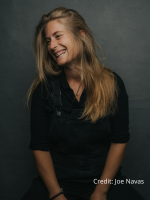My friend Drew Locke is a seventh-generation farmer in Truro. He’s always trying new things — partly because he’s curious and partly because even though he comes from a long line of farmers, a lot of intergenerational knowledge has been lost in recent decades and he’s focused on relearning the old ways. Drew went to college to study how to raise chickens on grass instead of grain, and since then he’s brought all sorts of other animals into the pasture — like turkeys and cows and pigs. This year, he decided to get into sheep and he says it’s been very challenging.
"The thing about the sheep is that they're here to breed and have lambs and every other farmer that I've dealt with have been, you know, you get them here, you have them thrive, have a great life, and then you process them," Drew explained.
The sheep are a cross between two breeds:
"So Katahdin-dorfer cross. So the Katahdin is a hair breed, they call, and the dorfer’s a dual breed."
Dual breeds produce both wooly fleeces and good meat. Hair breeds on the other hand have hair instead of wool and are known for their high reproductive rates. Drew is hoping to build a flock, so he wants good meat and lots of babies.
"So, so we got them in February and then two weeks later we got a ram down here, he came here and did his job. We just got rid of them back to Catherine Winkler's farm, and I sent her with two of the yearlings. So now we have four-yearlings and she has two yearlings and the ram."
A yearling is a year-old lamb.
Drew explained, "So they're, they're going to be their year in like a couple of months now, But you call them a yearling because that's when you can start to breed them. So it's lamb, then if you have a yearling, it's someone that you kept to breed."
Now, Drew’s yearlings are pregnant. As with any pregnancy, diet is critical. Sheep are heavily domesticated, so Drew has to watch them like a hawk because they’ve lost some of their natural feeding instincts.
"You know when I first got them I was feeding them the hay and the pasture as I thought was good but I was overfeeding them and they had a little bit of bloat, the problem with that is if you overfeed them you’re going to have a ten-pound lamb you’re going to have to pull out of them," he said.
"So now what I’m learning is that you have to really be specific about how much pasture they have access to in the day, versus the hay, versus the little supplemental minerals maybe a little bit of grain to make sure that they’re full, but not overfull, you know, you're constantly just looking at them and making sure that they're they're happy and healthy."
One of the best indicators, Drew’s learned, is to watch the sheep midday. If they’re relaxing, just chewing their cud, this is a good sign — if not, they’re probably either over or underfed. Another indicator is to look at the grass the sheep are eating — if the flock stays in one area for too long, the animals are likely to be plagued by parasites, which cycle through eggs that hatch out of their manure and can multiply really quickly.
"And then like, the parasite load, you got to figure out, okay, they’ve been on this pasture for this long. They haven't eaten it down completely, but we need to push them a little bit so that they're off of that."
If all goes well and the sheep stay healthy, soon there will be lambs — and that will be a whole new learning curve. The work of relearning what local farmers once knew about grass farming and figuring out the carrying capacity of his land is complicated, Drew says. He sometimes wonders why he keeps adding new animals — first chickens, then turkeys, pigs, cows and now sheep — but ultimately, he knows the answer.
"I love pasture, like I love being like a grass farmer and watching, just calculating it all, and the whole goal is to figure out what this, this pasture can handle and then stop there and just have our breeding stock and our cows and our chickens and our pigs and just rotate everybody."
One day, he’ll find that balance. In the meantime, Drew Locke will be outside in the pasture, figuring out sheep.








